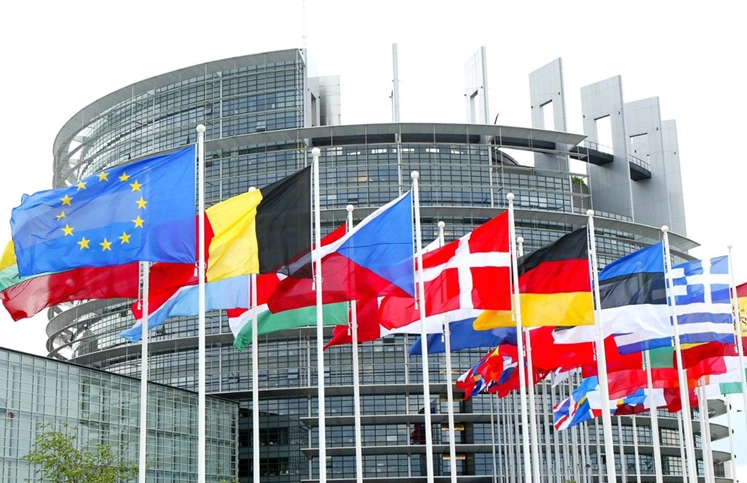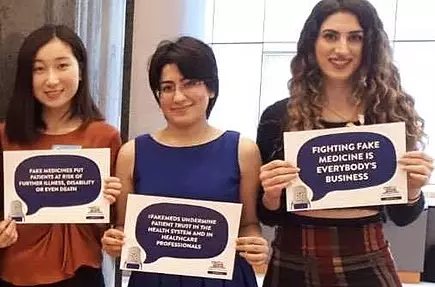
UCL Fight the Fakes
We are UCL Fight the Fakes, a group of students and staff at the UCL School of Pharmacy working to raise awareness about the dangers of substandard and falsified medicines globally. We work with Fight the Fakes and 35 other partners including the World Medical Association, the International Pharmaceutical Federation (FIP), International Pharmaceutical Students Federation (IPSF) and others to encourage people to speak up about issues surrounding medicines of poor quality.
On Tuesday 19 February 2019, we attended a roundtable discussion on the implementation status of the Falsified Medicines Directive (FMD) in hospital pharmacy. FMD introduces EU-wide legislation to help prevent counterfeit prescription medicines entering the pharmaceutical supply chain. The event took place at the European Parliament in Brussels and was co-hosted by MEP José Inácio Faria of the European People’s Party, Portugal, and the European Alliance for Access to Safe Medicines.
The meeting titled “Improving patient safety with the FMD in the hospital pharmacy, status of implementation” brought together 52 participants, including hospital pharmacists, patient safety organisations, EU Commission officials, health attachés of the Council of the EU, European and national agencies, industries and academics to debate the challenges and potential practical solutions within the European hospital setting.
Fake medicines are everybody’s problem. One in ten medicines sold in the developing world are thought to be fake. Lifesaving products such as antimalarials are fraudulently sold to those who need them most and as a result, 116,000 people die from malaria every year solely because of falsified medicines. However, this isn’t just a problem of the developing world. These fake medicines have infiltrated the legitimate supply chain of Europe and with the help of unregulated online pharmacies, risk the spread of disease. Seven million euros worth of falsified medicines were seized at the French borders alone last year.
On 9 February 2019, almost seven years after its adoption, the final elements of the FMD came into force introducing the end-to-end verification and safety features on prescription medicines across all Member States, representing a major advancement in inpatient safety. This is due to enhanced medicines security in the supply chain. These features include a uniquely identifiable data matrix at the point of dispensing and an anti-tamper device.
The roundtable aimed to create a positive and practical atmosphere, encouraging discussion around solutions that support implementation of prescription verification packs in the hospital pharmacy setting. Keynote contributions came from MEP Faria, EAASM executive director Mike Isles, the European Medicines Verification Organisation, the Finnish Medicines Verification Organisation, DG Health and Food Safety of the European Commission, the European Association Hospital Pharmacists, and four national hospital representatives from Spain, France, Germany and the UK. UCL Fight the Fakes founder and academic lead Oksana Pyzik, delivered a call to action for greater political will to fight fake medicines.
UCL students Romina Khajoue, Laylan Siddik and Dorothy Ho represented UCL Fight the Fakes and the voice of youth on this global health issue. Students also gained insight into the complexities of putting the FMD into practice and the additional constraints this will place on already squeezed pharmacy budgets in the UK. Aaron Cox from the NHS Wales Informatics Service discussed the progress made in Wales but explained that these advances may be stymied by Brexit. In the event of a no-deal Brexit, the FMD will be revoked and there will be no legal obligation for pharmacies within the UK to comply with the directive. Speakers suggested that as the UK will have no access to the EU central data hub the MHRA will have to build a national framework which could take up to three years to set up.
Concerns raised in this meeting pointed to the non-uniformity present across Europe, as some countries are not using the bar codes. There is also a reluctance of hospital managers to invest in FMD software, due to financing and staffing issues. Thus, administration hurdles have slowed implementation. However, the FMD has positively shaped the future of the hospital sector — integrating this software into hospitals has harmonised scanning.
The manufacture and distribution of falsified medicines has become an enormous, serious public health risk with an unknown cost to lives. We passionately believe in fighting the injustice that fake medicines bring about and will continue to campaign for safe medicines for all. Follow UCL Fight the Fakes on Twitter, Instagram and Facebook to learn how you can join the movement at @UCLFightsFakes and check out the Fight the Fakes website to learn about future events.

Source: UCL Fight the Fakes
About the authors:
Dorothy Ho (left), Romina Khajoue (middle) and Laylan Siddik (right) are MPharm students at UCL and members of UCL Fight the Fakes.
Oksana Pyzik is UCL Fight Fakes founder and academic lead.
You may also be interested in
The importance of diverse clinical imagery within health education

Government should consider ways to prevent ‘inappropriate overseas prescribing’ of hormone drugs, review recommends
